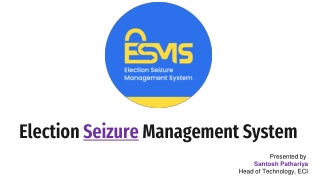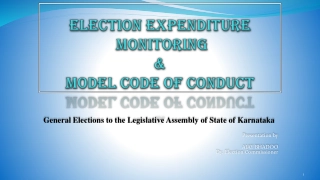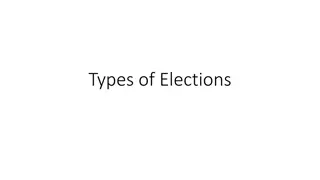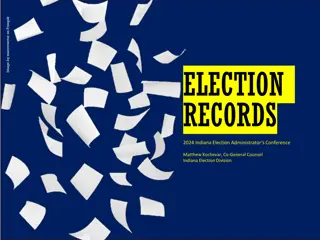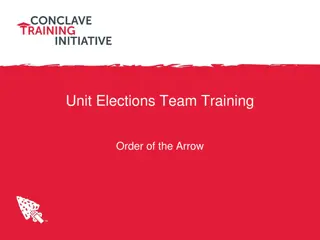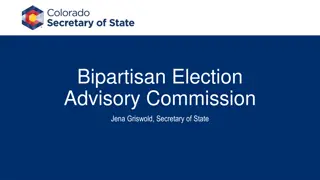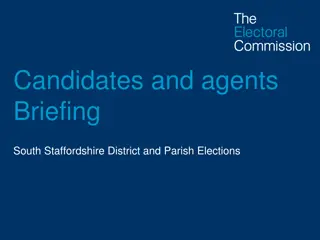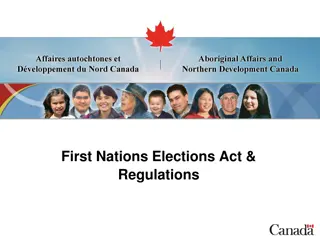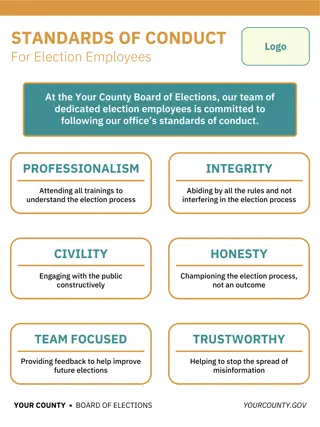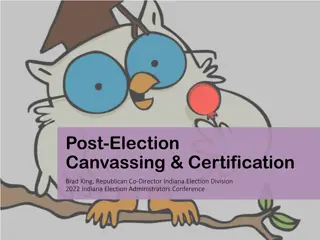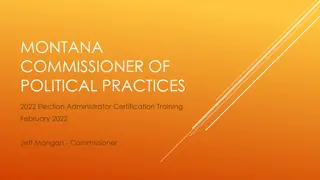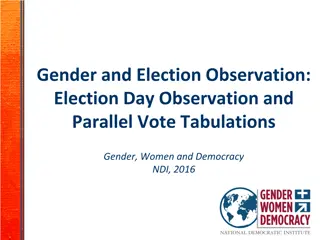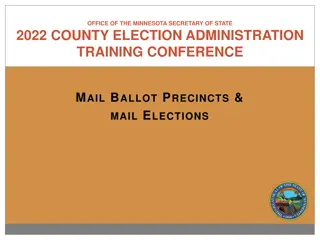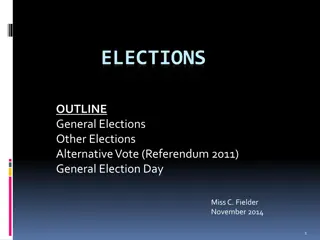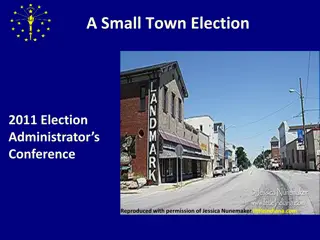Understanding Elections: Types, Procedures, and Election Commission of India
Election is a vital process where representatives are chosen by voting to govern the country. This article covers the meaning of elections, types such as general, mid-term, and by-elections, and the conduct of election procedures. It also delves into the Election Commission of India, its composition, appointment, tenure, independence, and removal criteria.
Download Presentation

Please find below an Image/Link to download the presentation.
The content on the website is provided AS IS for your information and personal use only. It may not be sold, licensed, or shared on other websites without obtaining consent from the author. Download presentation by click this link. If you encounter any issues during the download, it is possible that the publisher has removed the file from their server.
E N D
Presentation Transcript
ELECTION Presented by: Rinkey Sharma Assistant Professor of Law IILS
ELECTION Meaning Election is a procedure where persons are chosen, by voting ,to represent to voters for running the government. OR It is an Organized Process in which people vote to choose the persons who can represent them in Parliament or the State Legislative.
TYPES OF ELECTIONS 1.General Elections To elect Lok Sabha Members After term of Five years 2. Mid-Term Elections In case if Lok Sabha or State Legislative Assembly gets dissolved before the 5 years term 3. By- Elections When any member of Legislative assembly in Centre or State falls vacant on account of death, resignation or disqualification before end of the term.
CONDUCT OF ELECTION (ELECTION PROCEDURE) Announcement of Elections Nominations Scrutiny of Nominations Publication of List & Election Campaign The Poll Counting of Votes & Declaring Results
ELECTION COMMISSION OF INDIA (ARTICLE 324) Composition: It headed by Chief Election Commissioner (CEC) assisted by other Election Commissioners. CEC acts as a Chairman of the Election Commission. At present it is a THREE MEMBERED body.
Appointment: The Chief Election Commissioner (CEC) & other Election Commissioners are appointed by the President. President may also appoint Regional Commissioners to assist the Election Commission. Tenure of Office & Conditions of Service: The Chief Election Commissioner (CEC) & other Election Commissioners hold the office for the term of 6 years. However, they need to vacate the office if they attain the age of 65 years. Their salary is equal to the salary of Supreme Court. After retirement they get pension. All the decisions will be taken according to the opinion of MAJORITY in case there is difference in opinion among CEC and other ECs.
Independence of ECI: Removal: CEC and Other ECs can be removed in the manner as a Judge of Supreme Court. Other ECs can be removed only on the recommendation of CEC. No one can change the conditions of service of CEC. ECI has complete control over its staff on election duty.
POWERS, FUNCTIONS, AND RESPONSIBILITIES OF ELECTION COMMISSION The Constitution has vested to this body superintendence, direction and control of the entire process for conduct of elections. The Commission s functions and powers with respect to elections to the offices of the President, the Vice President, the state legislators and the Parliament are divided under three headings: Administrative Advisory Quasi-judicial
In details, these powers and functions are: Determining the Electoral Constituencies territorial areas throughout the country on the basis of the Delimitation Commission Act of Parliament. Preparing and periodically revising electoral rolls and registering all eligible voters. Notifying the schedules and dates of elections and scrutinising nomination papers. Granting recognition to the various political parties and allocating them election symbols. Acting as a court to settle disputes concerning the granting of recognition to political parties and allocating election symbols to the parties. Appointing officers for inquiring into disputes concerning electoral arrangements.
Determining the code of conduct to be followed by the political parties and candidates during elections. Preparing a program for publicising the policies of all the political parties on various media like TV and radio during elections. Advising the President on matters concerning the disqualification of MPs. Advising the Governor on matters concerning the disqualification of MLAs. Cancelling polls in case of booth capturing, rigging, violence and other irregularities. Requesting the Governor or the President for requisitioning the staff required for conducting elections. Supervising the machinery of elections throughout the country for ensuring the conduct of free and fair elections. Advising the President on whether elections can be held in a state that is under the President s rule, in order to extend the period of emergency after 1 year. Registering political parties and granting them the status of national or state parties (depending on their poll performance).
Important Articles related to Election Commission of India Article 324 Superintendence, direction and control of elections to be vested in an Election Commission. Article 325 No person to be ineligible for inclusion in, or to claim to be included in a special, electoral roll on grounds of religion, race, caste or sex. Article 326 Elections to the House of the People and to the Legislative Assemblies of States to be on the basis of adult suffrage. Article 327 Power of Parliament to make provision with respect to elections to Legislatures. Article 328 Power of Legislature of a State to make provision with respect to elections to such Legislature. Article 329 Bar to interference by courts in electoral matters.


